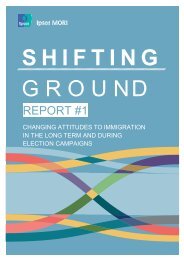Create successful ePaper yourself
Turn your PDF publications into a flip-book with our unique Google optimized e-Paper software.
Remembrance Sunday ceremony in London, marking the signing of the Armistice<br />
in 1914. At the same time, infantrymen from the Black Watch (Royal Highland<br />
Regiment) were fighting a fierce battle with insurgents in Fallujah – the site of some<br />
of the most intense guerrilla fighting after the capitulation of Saddam’s forces the<br />
previous year. Earlier <strong>that</strong> day, before attending the remembrance service, then<br />
Deputy Secretary General of the MCB, Mohammed Abdul Bari, gave an interview to<br />
the BBC’s Sunday Show on Radio 4. This exchange shows how Roger Bolton pressed<br />
Bari on the legitimacy of those fighting against British troops.<br />
Roger Bolton: Good morning<br />
Abdul Bari: Good morning<br />
RB:You've called the assault on Fallujah barbaric, but wasn't its occupation by Iraqi militants<br />
and foreign fighters, using civilians as shields, also barbaric?<br />
AB: Well we have to see what happened in the beginning, erm, as mentioned by some of, er, your<br />
people interviewed and I think agreed by the international community, <strong>that</strong> the occupation of Iraq<br />
was illegal. So, er, if people of Iraq want to come out and fight against the occupation army, we know<br />
<strong>that</strong> we also mention somewhere, we know there could be some people from outside Iraq <strong>that</strong> are<br />
coming and <strong>that</strong> is because the main reason <strong>that</strong> the occupation happened.<br />
RB: Do you think therefore <strong>that</strong> armed resistance of the sort we are seeing in Fallujah is<br />
legitimate? Do you support the fighters who are ranged against American and British troops?<br />
AB: Well, people of Iraq have to decide, because the war has been imposed on them.<br />
RB: I'm sorry, I'm asking if you, not the people in Iraq, do you therefore think it is legitimate<br />
for people to fight against the American and British troops in Iraq?<br />
AB: Well, it's for the people of Iraq to decide.<br />
RB: But it certainly could be legitimate, you're not telling them it's wrong.<br />
AB: Well, what we are saying is <strong>that</strong> the occupation of Iraq itself was wrong. 415<br />
What is it <strong>that</strong> the MoD expects an organisation such as the MCB to deliver –<br />
particularly when Muslims themselves are saying <strong>that</strong> such groups have no<br />
bearing on their decision to join the armed forces?<br />
Indeed, the MCB produced a short pamphlet in 2009 titled, ‘Remembering the<br />
Brave: the Muslim contribution to Britain’s Armed Forces’. 416 Their paper briefly<br />
outlines the historical contribution of Muslim service during the First and Second<br />
World Wars, noting many of the same characteristics of Muslim participation and<br />
motivation as recorded in the historical sections of this pamphlet. Interestingly,<br />
the MCB report acknowledges <strong>that</strong> during the Great War, ‘British Muslims<br />
supported the war effort in quite rational terms’. 417<br />
That was certainly the case. After all, how else could Muslim support for Britain<br />
be reconciled with the fact <strong>that</strong> British forces were actively fighting Ottoman troops<br />
for most of the war? Yet the pamphlet goes on to dismiss Muslim<br />
under-representation in the armed forces today by saying <strong>that</strong> ‘this is partly<br />
attributed to contentious operations <strong>that</strong> the United Kingdom is engaged around<br />
the world’. 418 Of course, while Britain’s military campaigns in Afghanistan and Iraq<br />
have attracted controversy, their potential ‘contentiousness’ is almost incomparable<br />
to <strong>that</strong> which faced Indian Muslims in 1914 when the Ottoman government incited<br />
them to jihad. The MCB pamphlet does not adequately explore the theological and<br />
political basis of Muslim motivation in the First and Second World Wars, which<br />
allowed ordinary Muslims to reconcile the competing demands on their allegiances.<br />
Conclusion – Reviving Muslim Service in the Armed Forces<br />
415 A copy of this recording is in<br />
Policy Exchange’s possession.<br />
416 Remembering the Brave: the<br />
Muslim contribution to Britain’s<br />
Armed Forces (A special report by<br />
the Muslim Council of Britain)<br />
(MCB, 2009).<br />
Available at: http://www.mcb.org<br />
.uk/downloads/Rememberingthe<br />
Brave_MCB.pdf<br />
417 Ibid, p.6<br />
418 Ibid, p.9<br />
policyexchange.org.uk | 87



